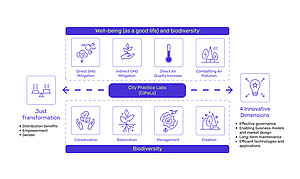Horizon JUST NATURE

Cities consume more than three quarters of the world’s energy and produce more than 60 % of greenhouse gas emissions. Reversing this situation will turn cities into models, leading the way towards a low-carbon society. One way to do this is to ensure there is enough ecological space, for example regarding clean air, thermal comfort and biodiversity. However, this is often exclusive to high-income neighbourhoods. Considering the right of all citizens to ecological space, the project JUSTNature will co-design new systems which conserve natural ecosystem values and functions and will ultimately provide numerous benefits to people.
The overall objective of JUSTNature is the activation of nature-based solutions (NBS) by ensuring a just transition to low-carbon cities, based on the principle of the right to ecological space. This in particular refers to the right to clean air and indoor/outdoor thermal comfort for human health and well-being, as well as thriving biodiversity and ecosystems. It also refers to the duty of not constraining the ecological space of others, in particular in relation to the mitigation of climate change and measures required for reducing GHG emissions. JUSTNature will contribute to this vision of shaping low-carbon cities by developing a set of typical Low carbon | High air quality NbS in seven European city practice labs (CiPeLs).
JUSTNature will simultaneously drive Innovation in 4 dimensions considered key to achieve the overall aim of low carbon cities:
1) Effective governance capabilities
2) Long-term NbS system maintenance & operation
3) Enabling business models and market design
4) Efficient technology & applications.
The Technical University of Crete will develop a cyclical indicator framework to monitor and evaluate the Low carbon | High air quality NbS. The framework will include urban metabolism, environmental and socio-economic criteria.
Go to the webpage that show the data that are collected from KYDON


